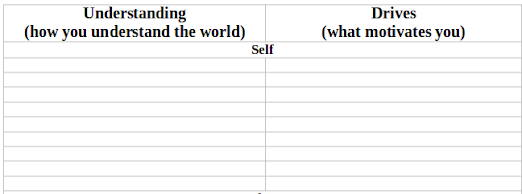The Mind-As-Forest: Some Thoughts On Mapping The Self
MBTI. Enneagram. The Big Five. The Dark Triad. A myriad of psychiatric conditions and disorders. Each capturing a small part of what makes us *us*.
But only ever a very small part. People cannot
be reduced down to some number of axes on which they vary. These are
useful tools for self understanding, yes, but they alone cannot provide a
big picture view. What we need is not a category to place ourselves in,
but a map. We are not some neat garden, but a forest of personality traits, experiences, traumas, values etc, all of which interact with each other in complex ways to produce eight billion different people at present.
And I think I have the beginnings of a mapping tool.
Emphasis on beginnings -- this is a start, not a finished product, and
it may or may not turn out to be useful.
It starts with two things: the drives one has towards a thing, and the way one understands said thing and takes in information. One to act, the other to recieve. This then breaks down into three categories: the self, the world (objects), and the other (subjects, i.e. relationships). Putting it together you get three tables, like this (replace self with the relevant area, such as world or other):
At least, that was my initial thought. Since then I realised that there are certain areas which are not covered by this, such as my tendency to get into obsessive loops until I have absolutely covered everything on a particular subject (my attention goes where it wills, I have little control over it). Perhaps this would fit into drives, but I don't want to shoehorn anything. Constructs such as this are to be used insofar as they are useful and modified or dropped insofar as they are not. So adding a column for tendencies (such as being fearful of trusting people?) may be a fruitful addition to this.
It also struck me recently that certain drives/understanding can be the same across all three areas. The though process one uses to understand the world is unlikely to be different from the one uses to understand the self, for example -- if you are inclined to categorise what is outside you, you are probably inclined to categorise what is inside you also. Keeping these things in a separate general table may be useful.
I hope this is helpful to someone. At some point, I will try and map out my own forest and share it, in the hopes of perhaps showing people some insight into how I think...

Comments
Post a Comment